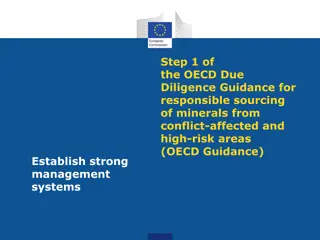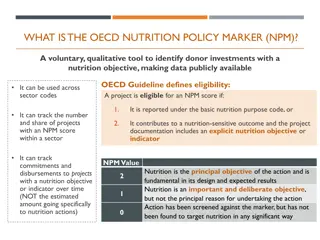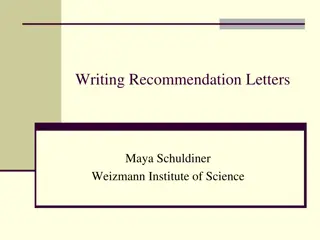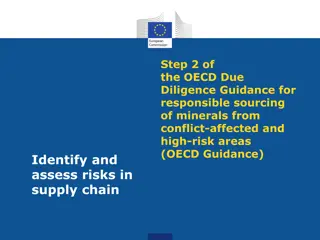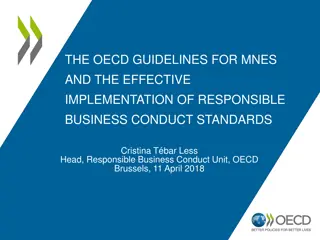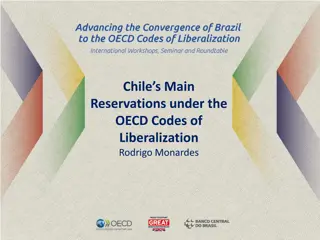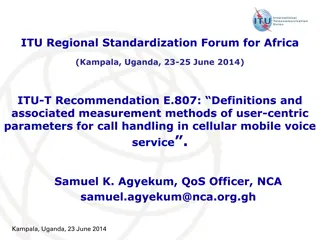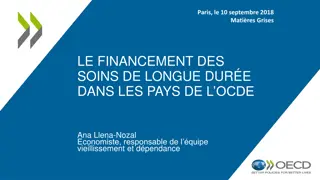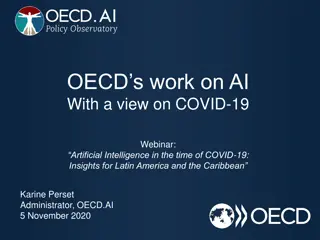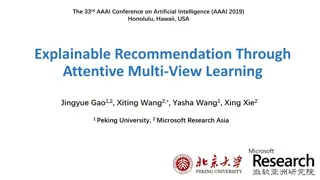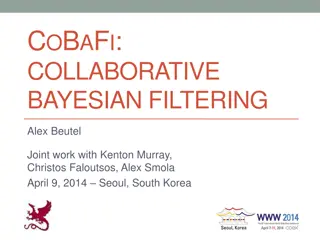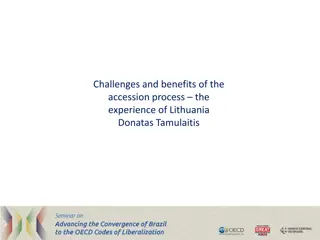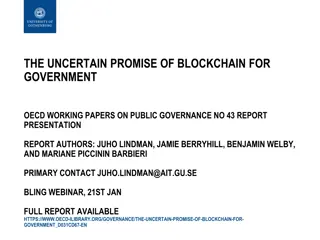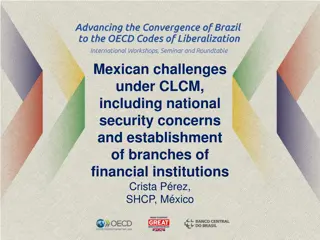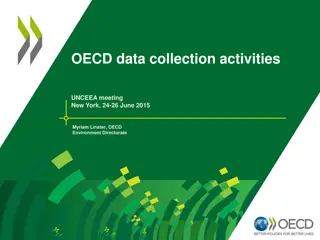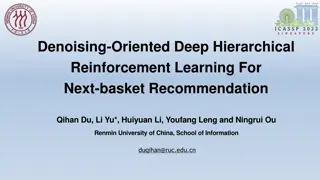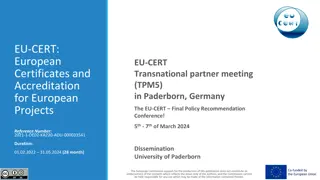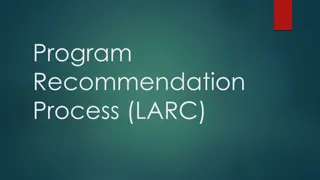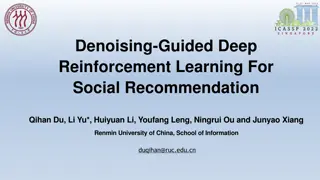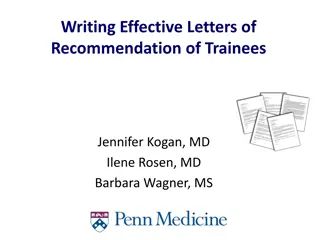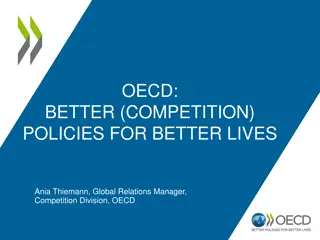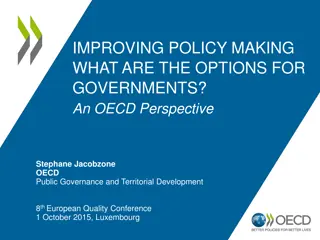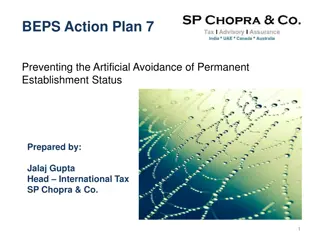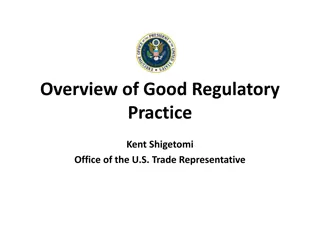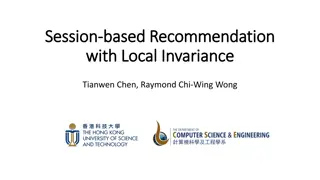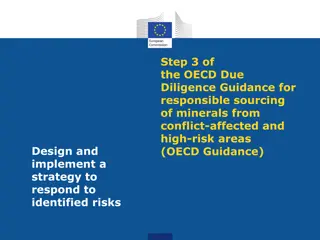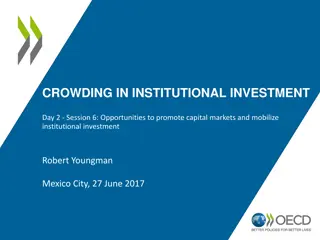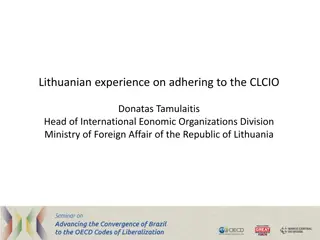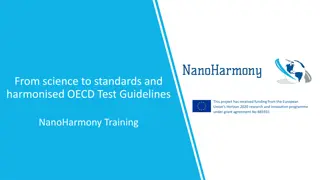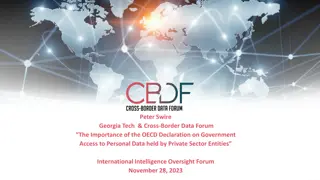Achieving Effective Delivery of Infrastructure Projects: Insights from OECD Seminar
Infrastructure investments play a crucial role in global development, but their successful delivery is becoming increasingly complex. Issues such as governance, ownership, and policy responsiveness can impact project outcomes. Without strategic management, projects may face challenges like inadequat
0 views • 24 slides
SUSTAINABLE WATER USE FOR GREEN HYDROGEN PRODUCTION: PRELIMINARY INSIGHTS FROM OECD WORK IN MONGOLIA
Preliminary insights from OECD work in Mongolia discuss the impact of green hydrogen production on water, sustainable approaches, and possible ways forward. The Sustainable Infrastructure Programme in Asia supports the transition towards net-zero infrastructure with a focus on enabling policies, pla
0 views • 14 slides
Challenges and Progress in Chilean Infrastructure Development
The challenges of Public-Private Partnerships (PPPs) in Chile within the framework of best practices and international standards are discussed, highlighting the need for long-term infrastructure planning and enhanced governance. The 2017 OECD Infrastructure Governance Review identified deficiencies
4 views • 40 slides
Challenges and Opportunities in Monitoring and Evaluation in OECD Countries
Monitoring and evaluation in OECD countries present unique challenges and opportunities, requiring clear mandates, ongoing processes, and robust institutional frameworks. The OECD approach emphasizes fostering quality, ensuring impact, and sharing lessons learned for efficient resource management. I
2 views • 12 slides
Enhancing Scalability and Performance in Deep Recommendation Systems with EVStore
EVStore presents a novel approach to scaling embedding tables in deep recommendation systems, offering a three-layer caching system that optimizes storage and caching capabilities. By leveraging groupability-aware caching, mixed-precision caching, and embedding approximation, EVStore achieves lighte
3 views • 33 slides
Programmatic items
The programmatic items for the INFCOM-3 Information Session include considerations of WMO Programmes relevant to the Commission, work programmes for the next intersessional period, and subsidiary bodies. Highlighted is the draft Recommendation 5/1 on the Expanded World Weather Watch Programme and th
2 views • 28 slides
Clinical Update on Management of Spontaneous Intracerebral Hemorrhage
This clinical update, adapted from the 2022 guideline by the American Heart Association and American Stroke Association, covers a comprehensive range of topics related to the management of patients with spontaneous intracerebral hemorrhage. It includes information on population health implications,
0 views • 38 slides
OECD Due Diligence Guidance: Establish Strong Management Systems
The OECD Due Diligence Guidance outlines the importance of establishing strong management systems for responsible sourcing of minerals from conflict-affected and high-risk areas. This involves adopting company policies, engaging with suppliers, implementing grievance mechanisms, and utilizing the 3P
0 views • 13 slides
Understanding the OECD Nutrition Policy Marker (NPM)
The OECD Nutrition Policy Marker (NPM) is a voluntary tool to identify donor investments with a nutrition objective. It helps mainstream nutrition in large-scale programs to improve outcomes and accountability. The NPM is applied at the project level to track investments and promote transparency in
1 views • 4 slides
Mastering the Art of Writing Effective Recommendation Letters
Understanding the importance and impact of recommendation letters in various contexts such as academic applications, job opportunities, promotions, and awards nominations. Guidelines on whom to write letters for and the reasons behind writing them. Emphasizes maintaining integrity and providing accu
1 views • 20 slides
Responsible Sourcing in Conflict-Affected Areas: OECD Guidelines
The OECD Due Diligence Guidance outlines steps for companies to identify and assess risks in mineral supply chains from conflict-affected and high-risk areas. It explains Conflict-Affected and High-Risk Areas (CAHRAs) and the importance of due diligence in responsible mineral sourcing to avoid finan
4 views • 16 slides
OECD Guidelines for Responsible Business Conduct
The OECD Guidelines for Multinational Enterprises provide a framework for responsible business conduct, encouraging sustainable practices and minimizing negative impacts. The OECD's work on responsible business conduct focuses on enhancing economic and social well-being globally, emphasizing ethical
1 views • 30 slides
Chile's Financial Services Liberalization Overview
This content provides an in-depth look at Chile's main reservations under the OECD Codes of Liberalization, including its context of accession to OECD Free Trade Agreements and commitments to liberalization in services, investments, and financial services. It covers aspects such as cross-border trad
5 views • 20 slides
OECD Expert Group on Disparities in National Accounts Work Summary
The OECD Expert Group on Disparities in National Accounts focuses on developing methodology to produce distributional results for household income, consumption, and saving. Their work involves adjusting national accounts totals, identifying relevant variables from micro data sources, imputing missin
0 views • 15 slides
User-Centric Parameters for Call Handling in Cellular Mobile Voice Service
The ITU Regional Standardization Forum for Africa held in Kampala, Uganda in June 2014 introduced ITU-T Recommendation E.807, focusing on the definitions and measurement methods of user-centric parameters for call handling in cellular mobile voice service. The recommendation outlines five key parame
1 views • 15 slides
Financing Long-Term Care in OECD Countries: Insights and Challenges
The funding of long-term care services in OECD countries poses significant financial and organizational challenges, with a growing proportion of the elderly population requiring such services. This article delves into the financing mechanisms, the public funding landscape, and potential reform pathw
0 views • 10 slides
OECD's Work on AI in Response to COVID-19: Insights for Latin America and the Caribbean
OECD is focusing on AI in the context of COVID-19, emphasizing the importance of trustworthy AI for societal benefits. The organization has outlined principles for implementing AI in policies, with a goal of fostering an ecosystem that prioritizes human rights, transparency, accountability, and more
0 views • 18 slides
Amazon (AMZN) - Overview, Growth Drivers, Risks, and Stock Recommendation
Amazon (AMZN) is a global e-commerce and cloud computing giant, known for its strong growth potential in segments like AWS and advertising. The company, founded in 1994, has diversified revenue streams and focuses on disruptive innovation. However, it faces stiff competition, profit uncertainty due
0 views • 17 slides
Tips for Obtaining Great Letters of Recommendation
Learn the strategies for obtaining strong letters of recommendation for scholarships and job applications. Discover the difference between good and outstanding letters, network effectively, and make compelling requests to enhance your chances of success.
0 views • 12 slides
Explainable Recommendation Using Attentive Multi-View Learning
The research presented at the 33rd AAAI Conference on Artificial Intelligence focuses on developing an explainable deep model for recommendation systems. It addresses challenges in extracting explicit features from noisy data and proposes a Deep Explicit Attentive Multi-View Learning Model. This mod
0 views • 19 slides
Collaborative Bayesian Filtering in Online Recommendation Systems
COBAFI: COLLABORATIVE BAYESIAN FILTERING is a model developed by Alex Beutel and collaborators to predict user preferences in online recommendation systems. The model aims to fit user ratings data, understand user behavior, and detect spam. It utilizes Bayesian probabilistic matrix factorization and
0 views • 49 slides
Challenges and Benefits of OECD Accession Process: Experience of Lithuania
The experience of Lithuania in the OECD accession process involves various objectives like national investment regime improvement, safeguarding measures, and coordination efforts with different ministries. Reservations and challenges in areas such as direct investment, real estate operations, and ba
0 views • 8 slides
The Uncertain Promise of Blockchain for Government - OECD Working Paper
This OECD working paper explores the potential impact of blockchain on government operations. Authored by Juho Lindman, Jamie Berryhill, Benjamin Welby, and Mariane Piccinin Barbieri, the report delves into the opportunities and challenges presented by blockchain technology in public governance. Juh
0 views • 19 slides
Challenges Faced by Mexico Under CLCM and Establishment of Financial Institutions
Mexico faced challenges related to national security concerns and the establishment of branches of financial institutions under the Codes of Liberalisation of Capital Movements (CLCM). The country's entry into the OECD in 1994 marked a significant period of liberalization and reforms, including exte
0 views • 13 slides
OECD Data Collection Activities Overview
OECD's data collection activities include interrelated work streams focusing on environmental data and indicators, database development, green growth, sectoral statistics, and regional analysis. The organization aims to provide comprehensive information to support policy-making and promote global co
0 views • 22 slides
Denoising-Oriented Deep Hierarchical Reinforcement Learning for Next-basket Recommendation
This research paper presents a novel approach, HRL4Ba, for Next-basket Recommendation (NBR) by addressing the challenge of guiding recommendations based on historical baskets that may contain noise products. The proposed Hierarchical Reinforcement Learning framework incorporates dynamic context mode
0 views • 16 slides
EU-CERT Transnational Partner Meeting and Final Policy Recommendation Conference
The EU-CERT project is organizing a Transnational Partner Meeting (TPM5) in Paderborn, Germany, followed by the Final Policy Recommendation Conference in March 2024. The dissemination activities include social media posts, printed materials, articles, and face-to-face meetings to promote the project
0 views • 14 slides
Program Recommendation Process (LARC)
Request a Labor Market Information (LMI) report to initiate the Program Recommendation Process. Fill out the SMC LMI form, gather Industry Advisory Board minutes, and submit the program application with required documentation for approval by the Academic Senate and Regional Consortium. Follow specif
0 views • 17 slides
Denoising-Guided Deep Reinforcement Learning for Social Recommendation
This research introduces a Denoising-Guided Deep Reinforcement Learning framework, DRL4So, for enhancing social recommendation systems. By automatically masking noise from social friends to improve recommendation performance, this framework focuses on maximizing the positive utility of social denois
0 views • 15 slides
Mastering the Art of Writing Effective Letters of Recommendation
Uncover the intricacies of crafting impactful letters of recommendation for trainees with insights on responsibilities, essential features, common pitfalls to avoid, and tailoring based on performance level. Delve into the challenges faced and embrace the fantasy land of LoRs while addressing key pr
0 views • 46 slides
Promoting Better Lives Through OECD's Competition Policies
The OECD's Competition Division works towards promoting fairer development, better education, healthcare, pensions, and employment through its outreach programs and global forums. The Global Forum on Competition engages participants from around the world to discuss topics like fighting corruption, p
0 views • 15 slides
Enhancing Policy Making: Options for Governments - An OECD Perspective
Various tools and approaches are discussed to improve policy making, including foresight, cost-benefit analysis, and regulatory tools. The changing context of policy challenges is highlighted, along with the OECD policy toolkit's modular approach. Strategies like talking to leaders, engaging stakeho
0 views • 20 slides
Understanding BEPS Action Plan 7: Preventing Artificial Avoidance of Permanent Establishment Status
The Action 7 Report aims to prevent artificial avoidance of Permanent Establishment (PE) status by making changes to the PE definition in the OECD Model Tax Convention. BEPS refers to tax planning strategies exploiting tax rule gaps to shift profits to low-tax locations. The OECD issued 15 action pl
0 views • 10 slides
Understanding Good Regulatory Practice in Trade Governance
Good Regulatory Practice (GRP) is a key aspect of regulatory policy that focuses on improving the quality and cost-effectiveness of domestic regulations. It involves internationally recognized processes such as impact assessment, regulatory transparency, participation, and accountability. The import
0 views • 22 slides
Enhancing Session-Based Recommendation with Local Invariance Model
Introducing local invariance to Session-Based Recommendation (SBR), the proposed model considers both detailed ordering and high-level session ordering. By explicitly capturing local context information and global sequential patterns, the model outperforms existing methods in predicting the next use
0 views • 19 slides
Responding to Risks in OECD Due Diligence Guidance
Develop and implement a strategic response to identified risks in accordance with the OECD Due Diligence Guidance for responsible sourcing of minerals. The process involves reporting findings to management, devising a risk management plan, implementing the plan, and assessing ongoing risks. Mitigati
0 views • 7 slides
Opportunities to Mobilize Institutional Investment in Capital Markets
Aligning trillions of dollars managed by OECD institutional investors towards green infrastructure investments presents a significant opportunity. Currently, only a small percentage of large pension fund assets are directed towards infrastructure, with an even smaller fraction allocated to green pro
0 views • 4 slides
Lithuanian Journey Towards OECD Accession: Key Coordination Efforts
Lithuanian's experience in adhering to the CLCIO, coordinated by Donatas Tamulaitis, focuses on various processes including OECD accession, communication with Member states, management of recommendations, and more. The journey started in 2014 with the initial list of reservations and progressed thro
0 views • 14 slides
NanoHarmony Training: Standards and OECD Guidelines Overview
Delve into the world of standards and OECD Test Guidelines with the NanoHarmony Training material. Learn about harmonized test methods, the role of science in guideline development, engagement with OECD committees, and the process of creating OECD Test Guidelines. Explore how stakeholders can contri
0 views • 16 slides
Challenges and Importance of Government Access to Personal Data in Cross-Border Intelligence Oversight
Reflecting on the significance of the OECD Declaration on Government Access to Personal Data held by Private Sector Entities, this content delves into the drivers necessitating an OECD-type process, such as law enforcement needs, globalization of criminal evidence, and convergence of civilian commun
0 views • 8 slides







